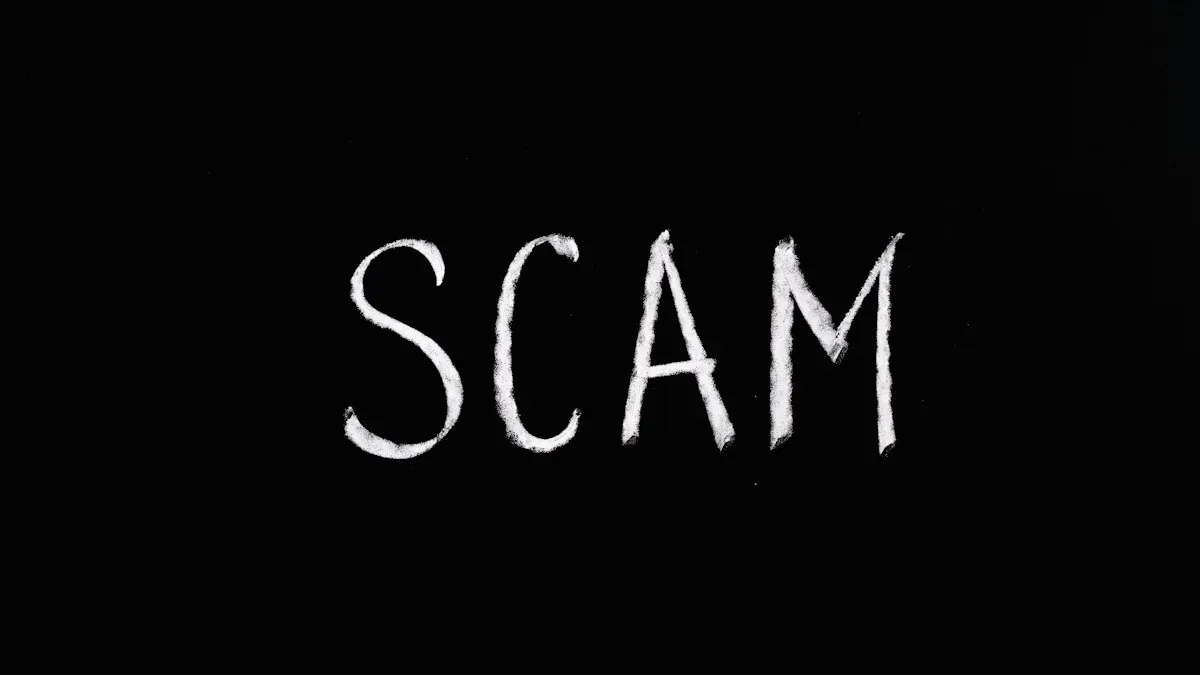- EasyCard
- Trade
- Help
- Announcement
- Academy
- SWIFT Code
- Iban Number
- Referral
- Customer Service
- Blog
- Creator
Must-Reads for Renting in the UK: Rental Traps and Common Scam Warnings

Image Source: pexels
In the UK rental market, scams and traps are commonplace. When searching for housing, you may encounter various risks:
- Wire transfer fraud, forged documents, illegal subletting, identity fraud, fake credit reports, and rental application scams
- Fake landlords, deposit traps, and illegal fees
Deposit protection, contract terms, safety equipment compliance, and various fees are key points in the rental must-read. Data shows that younger tenants are more likely to become victims:
| Age Group | Proportion of Rental Scam Cases |
|---|---|
| 18-29 | 48% |
| 30-39 | 25% |
| Others | 27% |
Key Points
- Before renting, always verify the landlord’s identity, request identification and proof of address, and ensure their legitimacy.
- Before signing a lease, carefully review the terms, confirm deposit protection, lease duration, and fee details to safeguard your rights.
- Choose reputable rental platforms like Rightmove and Zoopla, avoid obscure niche websites to reduce the risk of scams.
- Before paying a deposit, ensure you have physically viewed the property to avoid falling into deposit traps due to hasty payments.
- When encountering rental issues, promptly seek legal advice and professional support, and retain all relevant evidence to protect your rights.
Rental Must-Read Process

Image Source: pexels
Rental Channels
When renting in the UK, choosing legitimate channels is crucial. Many rental must-read guides suggest prioritizing large property agencies, well-known rental platforms, or accommodation services recommended by universities. Legitimate platforms rigorously vet landlords and properties. For example, platforms like Secureprop verify the identities of landlords and tenants, collecting and cross-verifying identification, proof of address, and legal documents. These measures effectively prevent fake listings and landlord scams. You can also check property details through the Land Registry to confirm the landlord’s identity and avoid being scammed.
Process Steps
The UK government recommends the following steps for safe renting:
- View the property in person or online and verify the authenticity of the information.
- Check if the landlord holds a valid license.
- Sign a formal lease agreement and conduct an inventory check.
- Request an Electrical Installation Condition Report (EICR), Gas Safety Certificate, and Energy Performance Certificate (EPC).
- Understand all fees to avoid being charged illegal fees.
- Pay rent and bills on time and take proper care of the property.
- Landlords are responsible for repairs and regular safety equipment checks to ensure no safety hazards.
Tip: Do not pay a deposit before verifying the landlord and property details. Many tenants fall into scams due to hasty payments or failure to check the landlord’s legitimacy.
Contract Key Points
The lease agreement you sign must include the following legal requirements to protect your rights:
| Legal Requirement | Details |
|---|---|
| Tenant Deposit Protection | Landlords must place the deposit in a government-approved deposit protection scheme within 30 days and provide details. |
| Written Lease Agreement | Clearly outlines the rights and responsibilities of tenants and landlords. |
| Timely Repairs | Landlords are responsible for structural repairs and must notify tenants promptly. |
| Energy Performance Certificate (EPC) | Landlords must provide an EPC rated E or above. |
| Legal Eviction Process | Evictions must be lawful, and tenants cannot be evicted for raising complaints. |
| Gas and Electrical Safety | Provide gas safety records and Electrical Installation Condition Reports (EICR). |
| Fire and Water Safety | Install smoke alarms, regularly inspect water sources, and assess Legionella risks. |
In the rental must-read process, carefully review contract terms to ensure deposit protection, lease duration, fees, and safety equipment comply with regulations. This minimizes risks and protects your rights.
Rental Must-Read Risk Identification

Image Source: pexels
Deposit Traps
When renting in the UK, deposit traps are very common. Scammers often use social media and classified ad websites (e.g., Facebook, Gumtree) to post fake rental listings. They pose as landlords and demand advance deposit payments. Many young people fall victim to these ads, with approximately 5,000 related cases in the UK last year, resulting in losses of nearly USD 9 million. Some victims are even deceived after viewing properties. Scammers often use excuses like “the property cannot be viewed” to urge quick payments.
- Common deposit traps include:
- Requiring you to pay a deposit before verifying the landlord’s identity
- Offering extremely low rent to entice quick decisions
- Refusing in-person viewings or providing fake photos
Tip: Request the landlord to provide deposit protection scheme documents and verify property details through the Land Registry. Do not pay any fees before signing a formal contract.
Fake Listings
Fake listings are a key rental must-read risk in the UK. Scammers post nonexistent properties on social platforms or niche websites to lure you into contact. You may encounter properties priced far below market rates or descriptions that significantly differ from reality. Be cautious of these “too good to be true” rental listings.
- You can take the following steps to verify the authenticity of a listing:
- Search the property address online to check for inconsistencies
- Confirm through the Land Registry if the landlord is the true property owner
- Visit the property in person and avoid relying solely on photos or videos
- Consult reputable agencies or rental platforms
You should also understand your rental rights and seek help promptly when encountering suspicious listings.
Fake Landlord Scams
Fake landlord scams are common in the UK rental market. Scammers impersonate landlords, exploiting your trust to perpetrate fraud. Common tactics include:
- Pressuring you to skip credit and background checks for immediate deals
- Failing to provide identification, such as bank statements or passports
- Only allowing agents to show the property while remaining absent
- Demanding cash payments and refusing to disclose personal background
- Urging you to sign long-term contracts without viewing the property
In the rental must-read process, insist on meeting the landlord or a legitimate agent and verify their identification. Choosing agents or landlords affiliated with professional organizations significantly reduces the risk of scams.
Subletting Issues
Subletting issues are particularly severe in large cities like London. Many tenants unknowingly rent properties sublet without the landlord’s permission. Data shows that 11% of UK tenants engage in subletting, but only 5% have the landlord’s approval. Unauthorized subletting has risen significantly in recent years, becoming a major concern for both landlords and tenants.
| Evidence Source | Main Content |
|---|---|
| Illegal sub-letting at ‘epidemic’ levels claims TV evictions star | Illegal subletting in London has reached ‘epidemic’ levels, becoming a serious issue. |
| Sub-letting scams and their impact on prime residential London | 11% of UK tenants sublet, but only 5% have landlord permission, indicating the presence of professional scammers. |
| Behind every lease, a hidden risk: The rise of subletting scams | Unauthorized subletting has risen significantly, becoming a major concern for landlords. |
In the rental must-read process, request the landlord’s authorization documents to confirm the subletter’s legal rights. Consult legitimate platforms or professional organizations when encountering suspicious situations.
Unreasonable Fees
UK law clearly regulates rental fees. When renting, you may encounter unreasonable fee traps. Some agents or landlords charge prohibited fees, such as viewing fees, credit check fees, or administration fees. You need to understand which fees are permitted and which are banned.
| Permitted Fees | Prohibited Fees |
|---|---|
| Rent | Viewing fees |
| Tenancy deposit (up to 5 weeks’ rent) | Credit check fees |
| Holding deposit (up to 1 week’s rent) | Reference fees |
| Change, assignment, or renewal fees (up to USD 50) | Administration/renewal fees |
| Early termination fees (reflecting actual losses) | Exit fees |
| Utilities, communication, TV license, council tax | Professional cleaning fees |
| Default fees (e.g., late rent) | Pet-related fees/deposits |
| Third-party service fees (unless voluntarily chosen by the tenant) |
Before signing a contract, carefully review all fee details and refuse to pay any illegal fees.
Ad Authenticity
When browsing rental ads, you may be misled by false information. Scammers often use spelling errors, inconsistent details, or low-price lures to attract you. You can verify ad authenticity with the following methods:
- Choose reputable rental websites, prioritizing well-known platforms
- Look for inconsistencies in listing descriptions, such as location, amenities, or rent
- Search the property address, contact number, and company name online for negative reviews
- Trust your instincts and stay alert to unusual information
- Never pay rent or deposits before signing a formal contract
Tip: In the rental must-read process, proactively request safety certificates and verify property details to protect your rights.
Risk Prevention Measures
Identity Verification
In the rental must-read process, the first step is verifying the landlord’s identity. Many scams stem from unidentified “landlords” or agents. You can request the landlord to provide the following documents and carefully verify them:
| Document Type | Description |
|---|---|
| Personal Documents | Driver’s license, passport, and bank statements are required. |
| Proof of Address | At least two documents showing the current address, such as bank or building society statements, council tax bills, etc. |
| Certified Copies | Signed by a lawyer, banker, or other professional with “original seen” noted. |
You can also check property details through the Land Registry to confirm if the landlord is the true owner. If the landlord cannot provide these documents, stay vigilant. For flats, ask if the landlord has the freeholder’s consent. For houses, confirm if the landlord is the owner and whether there’s a mortgage with relevant consent.
Tip: Don’t trust “landlords” contacted solely through social platforms; always meet in person to verify identity and documents.
Contract Signing
Signing a legally valid lease agreement is key to protecting your rights. Follow these steps:
- Review laws related to tenancy agreements, such as the Housing Act 1988 and Landlord and Tenant Act 1985.
- Check the agreement for any illegal terms.
- Notify the landlord promptly if issues are found and request amendments.
- Read the contract carefully to understand both parties’ rights and obligations.
- Confirm the contract is a standard assured shorthold tenancy or assured tenancy.
- Ensure all parties have signed.
- Verify the contract complies with local laws.
- Negotiate reasonable terms to ensure fairness.
- Ensure the contract is clear and concise, avoiding complex jargon.
- Specify the lease end date.
- Clarify tenant obligations and ensure they are reasonable.
- Ensure all signatures and dates are complete for legal validity.
In the rental must-read process, keep the original contract and all communication records. Consult professionals if you encounter unreasonable terms.
Deposit Protection
UK law requires landlords to place your deposit in a government-approved deposit protection scheme. You can confirm if your deposit is protected as follows:
| Legal Requirement | Description |
|---|---|
| Deposit Protection Scheme Selection | Landlords and agents can choose custodial or insurance-based schemes. |
| Deposit Protection Timeline | Landlords must place the deposit in a scheme within 30 days of receipt. |
| Information Provision | Landlords must provide tenants with detailed deposit protection information, including ‘prescribed information.’ |
| Compliance Confirmation | Tenants can request the scheme administrator to confirm if the deposit is protected per the scheme’s rules. |
- Contact the deposit protection scheme administrator to confirm proper protection.
- Administrators will respond to your inquiries promptly.
- Landlords or agents must provide accurate information and documents and sign relevant proofs.
If the landlord fails to provide deposit protection proof, you can complain to relevant authorities and seek compensation.
Property Inspection
Before signing a lease, conduct a thorough property inspection. This prevents disputes over property issues after moving in. Take these steps:
- Notify the landlord 24-72 hours in advance and ensure their presence.
- Bring a detailed checklist to inspect the roof, walls, windows, floors, plumbing, etc.
- Take photos and videos to document all issues found.
- Check the property’s cleanliness and safety equipment, such as smoke alarms and locks.
- Obtain signed copies of all inspection documents as evidence for future disputes.
- Inspect all external and internal details thoroughly.
Suggestion: Invite a friend or professional to accompany the inspection for a more comprehensive check.
Legitimate Platforms
Choosing legitimate rental platforms is an effective way to prevent scams. Prioritize the following platforms:
- Rightmove: The UK’s largest property portal with transparent information and abundant listings.
- Zoopla: Provides detailed rental information with a user-friendly interface.
- OpenRent: No management fees, transparent process, and a large user base.
- Spareroom: Specializes in flatshares and roommate matching with diverse filtering options.
- RoomGo: Manually reviews listings and supports direct landlord contact.
- MoveBubble: Instant chat functionality for easy communication.
- Gumtree: Wide coverage for diverse property searches.
- Find A Hood: Matches personalized listings through questionnaires.
- Airbnb: Ideal for short-term rentals with flexible landlord management.
In the rental must-read process, prioritize these platforms to find properties and avoid unverified niche websites. Legitimate platforms typically vet landlords and listings, significantly reducing scam risks.
Reminder: Regardless of the platform, always verify the landlord’s identity, sign a formal contract, and protect your deposit to maximize your rights.
Handling Issues and Reporting
Dispute Resolution
When renting in the UK, if you encounter contract disputes, deposit deductions, or scams, take proactive steps to resolve them. First, communicate with the landlord or agent to attempt a resolution. If unsuccessful, protect your rights through these methods:
- Retain all relevant evidence, including contracts, payment records, emails, and chat logs.
- Apply for assistance from third-party mediation bodies, such as tenancy arbitration services.
- Consult professional organizations to understand your legal rights.
Remember: Acting promptly and preserving evidence are key to dispute resolution. Don’t delay; seek help quickly.
Legal Advice
In the UK, you can access various free legal advice services. For rental contract disputes or scams, these organizations offer professional guidance:
- Citizens Advice Bureau: Provides legal and practical advice for tenants.
- ARU Law Clinic: Offers legal consultation services to help you understand dispute resolution processes.
- Law Works: Provides free legal aid for individuals.
- Shelter: Specializes in housing issues, supporting tenants in resolving rental disputes.
These organizations offer contract interpretation, dispute resolution advice, and legal aid. Many provide online consultations for easy access.
Reporting Process
If you fall victim to a rental scam, take these immediate steps:
- Visit the Action Fraud website, fill out relevant information, and report the rental scam. Action Fraud is the UK’s national fraud and cybercrime reporting center.
- Provide as much evidence as possible, including emails, payment receipts, and received documents.
- If funds are stolen, report to the police promptly to assist the investigation.
- The Action Fraud website also provides the latest advice and support on rental scams.
- Report rental scams through these methods:
- Submit an online reporting form
- Call the Action Fraud hotline
- Consult professional organizations for follow-up advice
Actively cooperate with investigations and preserve all evidence. Timely reporting helps both yourself and prevents others from becoming victims.
When renting in the UK, you may encounter fake landlords, deposit traps, and fraudulent listings. The London Trading Standards reminds you to pay only after viewing the property and to complete transactions via bank transfer. Many rental scam cases target the 18-39 age group, with losses nearing USD 9 million last year. You can protect yourself through legitimate agents and government-approved platforms, ensuring your deposit is legally protected. For issues, seek help from organizations like the Citizens Advice Bureau for legal and emotional support. The rental must-read content helps you identify risks and protect your rights.
- Pay attention to these key points:
- View the property and verify the landlord’s identity
- Sign a legal contract and protect your deposit
- Use reputable agents and platforms
- Proactively seek legal and professional support
| Age Group | Proportion of Rental Fraud Cases | Loss Amount |
|---|---|---|
| 18-29 | 48% | USD 9 million |
| 30-39 | 25% | |
| Others | 27% |
FAQ
How do you confirm if a landlord’s identity is genuine?
Request the landlord to provide a passport and proof of address. You can also check property details through the Land Registry. This effectively prevents fake landlord scams.
Tip: Don’t communicate with landlords solely through social platforms; always meet in person to verify identity.
What is a deposit protection scheme, and what should you watch for?
A deposit protection scheme is a legally required deposit management system in the UK. Ensure your deposit is placed in a government-approved scheme and request relevant proof.
| Deposit Protection Scheme | Deposit Timeline | Proof Requirement |
|---|---|---|
| Government-approved | Within 30 days | Mandatory |
What should you do if you encounter a rental scam?
Preserve all evidence, including contracts and payment records. Report the case through the Action Fraud website. You can also seek legal help from the Citizens Advice Bureau.
Which contract terms are most important?
Focus on lease duration, deposit protection, fee details, and repair responsibilities. Ensure the contract is clear with explicit rights and obligations. Have a professional review the contract if needed.
Which legitimate platforms can you use for safe renting?
Choose well-known platforms like Rightmove, Zoopla, and OpenRent. These platforms vet listings and landlord information, reducing scam risks.
You have completed a thorough review of UK rental risks, understanding common pitfalls like deposit scams, fake listings, fraudulent landlords, and illegal fees. You are now equipped with essential prevention measures such as identity verification, contract signing best practices, deposit protection checks, and choosing legitimate platforms. You recognize that vigilance and meticulous due diligence are paramount to safeguarding your rights in the UK rental market.
Given the complexities of the rental landscape and the constant evolution of scams, you need a secure and reliable financial technology platform that can help you efficiently manage funds, mitigate cross-border fee risks, and support your global financial planning.
BiyaPay is your ideal solution for managing global finances and addressing cross-border needs. BiyaPay offers you real-time exchange rate inquiry and conversion services, allowing you to maximize control over transaction costs when paying rent or transferring international funds. Through the BiyaPay platform, you can seamlessly convert between various fiat and digital currencies and participate in global market trading, such as Stocks, all within one platform for flexible asset allocation. Click the Real-time Exchange Rate Inquiry now, and BiyaPay for quick registration, and use one secure, efficient platform to navigate your UK rental life and global financial management with greater peace of mind.
*This article is provided for general information purposes and does not constitute legal, tax or other professional advice from BiyaPay or its subsidiaries and its affiliates, and it is not intended as a substitute for obtaining advice from a financial advisor or any other professional.
We make no representations, warranties or warranties, express or implied, as to the accuracy, completeness or timeliness of the contents of this publication.




Contact Us
Company and Team
BiyaPay Products
Customer Services
is a broker-dealer registered with the U.S. Securities and Exchange Commission (SEC) (No.: 802-127417), member of the Financial Industry Regulatory Authority (FINRA) (CRD: 325027), member of the Securities Investor Protection Corporation (SIPC), and regulated by FINRA and SEC.
registered with the US Financial Crimes Enforcement Network (FinCEN), as a Money Services Business (MSB), registration number: 31000218637349, and regulated by FinCEN.
registered as Financial Service Provider (FSP number: FSP1007221) in New Zealand, and is a member of the Financial Dispute Resolution Scheme, a New Zealand independent dispute resolution service provider.



















